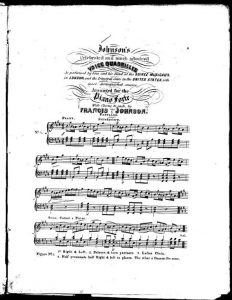Despite being a Black composer and bandleader in Philadelphia during the early 19th century, Francis Johnson was one of the most celebrated American composers of his time, period. While this undoubtedly had something to do with the liberal and progressive atmosphere of Philadelphia, it was also due to his talent and the innovative and experimental nature of many of his compositions. However, some argue that he merely excelled in existing genres and was popular not because of his unconventional style, but precisely because he catered to white tastes.1 I found a copy of Johnson’s “Celebrated and much admired voice quadrilles” in the Sheet Music Consortium database, which Johnson dedicated to a wealthy local businessman.2 The subtitle proclaims that Johnson and his band found “much distinguished success” while embarking on what was the first tour of Europe by any American band, revealing that his celebrity was not limited to Philadelphia.1 The quadrille was an elaborate dance form that was very popular among the upper classes in the first half of the 19th century.3 The circumstances of this piece’s composition and publication reveal that Johnson’s success had much to do with his catering to upper-class interests.
However, the music itself shows Johnson’s willingness to experiment. Popular music written by Johnson and others at the time was often published in arrangements that could be performed by amateur pianists in the home.1 As a result, this quadrille, written for piano and voice, is mostly very simple rhythmically, but Johnson also embellishes the piece with a more lively and rhythmically complex cornet solo. Johnson annotates his music with instructions to the dancers, in addition to the lyrics. The very idea of a “voice quadrille” was a novel one, as the genre was traditionally instrumental.4 The lyrics themselves are lighthearted, with a “laughing finale” that literally calls for the singers to sing “ha ha ha”.
While the quadrille was a highly ritualized genre that was popular among the upper classes, Johnson’s ability to play with the conventions of that genre shows that his success was not only a result of catering to upper-class tastes but actually a result of subverting them. Johnson provides an interesting example of the kind of creative mixing of genres that occurred when Black Americans came into contact with European music, as his success came from privilege and access to white upper-class society rather than the oppression of slavery. Johnson achieved a number of firsts among American composers, showcasing his boldness and willingness to go beyond what was expected.4 In fact, Johnson was the first composer writing for white audiences to address the topic of slavery and the suffering it caused, showing that in some cases his success was actually despite this boldness. While his education in and use of European musical styles perhaps reflected a desire to fit in with the white cultural elite, along with a desire by that elite to embrace a Black person who had proved himself able to assimilate, Johnson’s success was ultimately due to his ability to engage in the musical styles of the cultural elite and bring something new to them.
References:
1 Griscom, Richard. “Francis Johnson: Philadelphia Bandmaster and Composer.” University of Pennsylvania Almanac, February 14, 2012. https://almanac.upenn.edu/archive/volumes/v58/n22/bandmaster.html.
2 Schnurmann, Claudia. “His Father’s Favored Son: David Parish.” Immigrant Entrepreneurship. German Historical Institute, August 22, 2018. https://www.immigrantentrepreneurship.org/entries/his-fathers-favored-son-david-parish/#Between_Philadelphia_and_Ogdensburg_1806-1816; Johnson, Francis. Johnson’s Celebrated and Much Admired Voice Quadrilles. Geo. W. Hewitt and Co., Philadelphia, monographic, 1840. Notated Music.
3 Skiba, Bob. “Here, Everybody Dances: Social Dancing in Early Minnesota.” MN History Magazine. Accessed October 18, 2022. https://collections.mnhs.org/MNHistoryMagazine/articles/55/v55i05p217-227.pdf.
4 Kramer, Hayden James. 2022. “Six Works by Francis Johnson (1792–1844): A Snapshot of Early American Social Life.” Order No. 29162008, University of Maryland, College Park. https://www.proquest.com/dissertations-theses/six-works-francis-johnson-1792-1844-snapshot/docview/2688578944/se-2.
